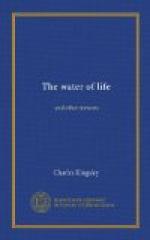By his faith, plainly, in a just Ruler of the world,—in a God who avenges wrong, and makes inquisition for innocent blood. He who will keep his faith in that just God, will remain just himself. The sense of Justice will be kept alive in him; and the just will live by his Faith.
The prophet believes that message; and a mighty change passes over his spirit. In a burst of magnificent poetry, he proclaims woe to the unjust Chaldean conqueror. All his greatness is a bubble which will burst; a suicidal mistake, which will work out its own punishment, and make him a taunt and a mockery to all nations round. ’Woe to him who increaseth that which is not his, and ladeth himself with thick clay! Woe to him that coveteth an evil covetousness to his house, that he may set his nest on high, and be delivered from the power of evil! Woe to him that buildeth a town with blood, and stablisheth a city with iniquity! Behold, is it not of the Lord of hosts that the people shall labour in the very fire, and the people shall weary themselves for very vanity?’ There is a true civilization for man; but not according to the unjust and cruel method of those Chaldeans. The Law of the true Civilization, the prophet says, is this: ’The earth shall be full of the knowledge of the Lord, as the waters cover the sea.’
But what is this to us? Are we like the Chaldeans? God forbid. But are we not tried by the same temptations to which they blindly yielded? A nation, strong, rich, luxurious, prosperous in industry at home, and aggressive (if not in theory, certainly in practice) to less civilized races abroad—are we not tempted daily to that habit of mind which the prophet calls—with that tremendous irony in which the Hebrew prophets surpass all writers—looking on men as the fishes of the sea, as the creeping things which have no ruler over them, born to devour each other, and be caught and devoured in their turn, by a race more cunning than themselves? There are those among us in thousands, thank God, who nobly resist that temptation; and they are the very salt of the land, who keep it from decay. But for the many--for the public—do not too many of them believe that the law of human society is, after all, only that internecine conflict of interests, that brute struggle for existence, which naturalists tell us (and truly) is the law of life for mere plants and animals? Are they not tempted to forget that men are not mere animals and things, but persons; that they have a Ruler over them, even God, who desires to educate them, to sanctify them, to develop their every faculty, that they may be His children, and not merely our tools; and do God’s work in the world, and not merely their employer’s work? Are they not—are we not all—tempted too often to forget this?




